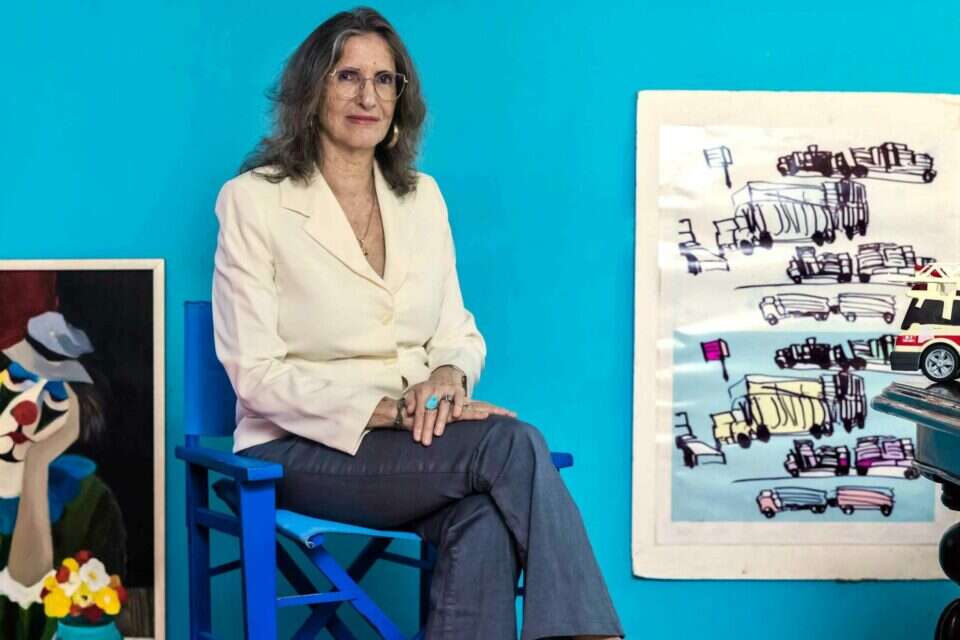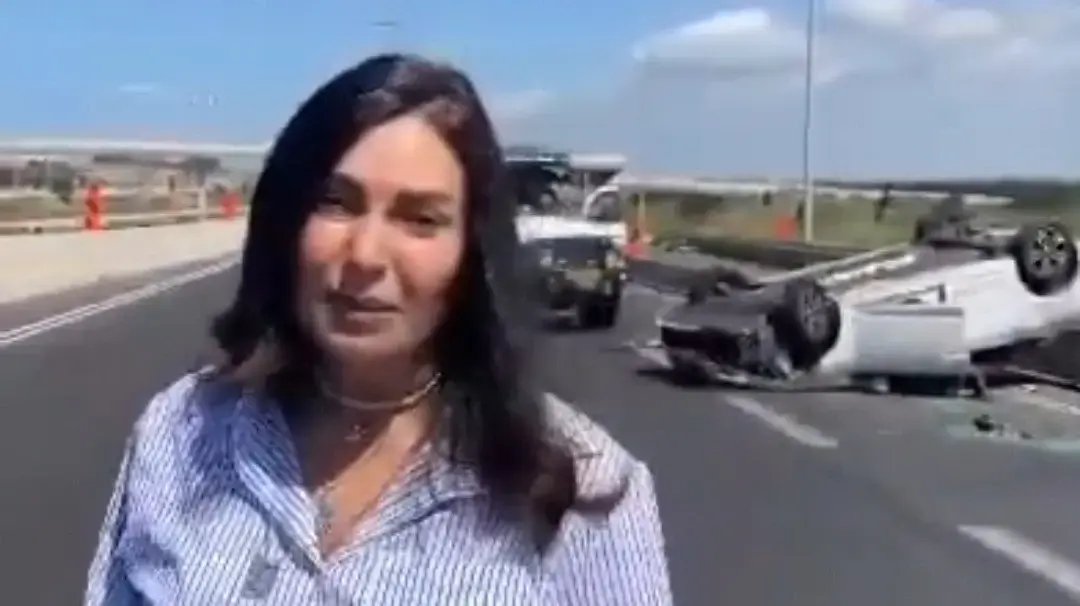Prof. Tova Rosenblum, as a researcher of the human factor in road accidents, what is your personal experience of Israeli roads?
"I'm a nerdy driver. I don't consider myself an excellent driver, sometimes I hesitate too much, and I'm very careful. While driving, I sometimes have headlines running through my head - 'the accident investigator who committed an accident', that's my nightmare, so I drive slowly, always on the right side, And I try to do everything in my power to avoid danger. Even as a pedestrian, I always wait for the traffic light to change to green, even if the road is empty. I can't cross a red light."
Do you dare talk on the phone while driving?
"I'm against it, but sometimes it happens that I talk, although not important conversations. When it comes to important conversations, I put them aside or postpone them for another time. It's important that Israeli drivers remember: it's true that it's legal to talk on the phone with a hands-free phone, but it doesn't matter if you hold the With the phone in hand, what changes is the very act of having the conversation, and the cognitive resources we invest in it."
We are holding this important conversation against the backdrop of the terrible August, with the multitude of accidents it brought to our doorstep. It turns out that the concentration of accidents there is not accidental. why?
"The education system is shut down, parents and their children go out to have fun, the interactions on the roads between the various road users increase, and to this must be added the Israeli heat of August which has a negative effect. People become more nervous, and at the same time feel that it is possible to 'let loose' a little. It is a combination of human circumstances that create a higher probability for accidents. August, by the way, is one of the two worst months of the year in terms of road accidents. To that should be added January - which was added to the list due to the heavy rains, which disrupt the Israeli mentality. People are stressed, the infrastructure is damaged, and the natural flow of traffic on the roads is affected."
"There are risk seekers and there are those who stay away from them. The majority is in the middle, but in recent years there has been a certain spillover towards taking risks."
Accident on Route 412, photo: Gideon Markovich
You believe that the natural flow of traffic depends on a combination of factors, but in an elementary way - your research comes from a desire to deeply understand the human factor.
"True. And if we refer to the individual level, each of us has a level of risk that he likes to take. One of the well-known theories in this matter is, loosely translated, 'risk regulation.' certain towards taking risks".
How is this expressed?
"On a dangerous road, for example going down Mount Meron, when the field of vision is limited and the road is narrow, even those who love danger will lower the level of risk: they will not talk on the phone, turn down the radio, reduce speed, be more attentive and will not even answer the person sitting next to them.
"But on Route 2, for example, which is known to be sophisticated - the same type will perceive the level of risk on this road, which invites dangerous driving, as low. Therefore, he will have to create dangers in order to satisfy himself. Thus, for example, he will use the phone, which may lead to an accident. On the other hand , when someone is in a low place on the thrill-seeking index, he will perceive that road as dangerous and will try to avoid a possible injury."
Danger on two wheels
I want to add another layer to the character of the drivers - time. Some of us are thrill-seekers, nervous, find it difficult to deal with the August heat, and besides that - we also have an arrival time that must be met. Sounds like a combination that could prove fatal.
"In our research on pedestrians, we observed students getting off a bus near Bar-Ilan University. In short, the closer the time was to being even and round, i.e. the start of classes, we saw more people crossing a red light, regardless of their personality and even regardless of whether they were standing In front of them was a policeman stationed nearby. The most important thing for them was not to be late for class."
"When the education system is shut down, families go out to spend time, and the heat has a negative effect. People become more nervous. That's why August is among the two worst months of the year in terms of car accidents. Even in January, the heavy rains disrupt the Israeli mentality."
And of course this is also relevant to any driver who wants to arrive on time for work or a meeting.
"Your question is related to the psychological process of driving. A driver in his car enjoys, as it were, a state of anonymity. We will not meet face-to-face the person who did not give him the right of way, he cannot take revenge on us. There is also self-justification here - those who usually obey the law, do not feel that they commits a crime only because he is in a hurry. In that person's internal balance, he is fine, because he knows that he must not be late for an important meeting or a flight, for example."
In this context, in one of your articles it emerged that pedestrians in ultra-Orthodox cities commit three times more offenses compared to secular cities. Why, actually?
"In different religions, religious people feel that they will be watched over from above. They are characterized by less fear of death compared to the secular ones. Demographically, because every ultra-Orthodox family has on average more than four children, the norm is to send children to cross roads with children younger than them. In this way, mothers find it difficult to watch over their children. Furthermore, in Bnei Brak, the apartments are relatively small, so people are outside more, which puts them at greater risk. Another reason is that the proportion of drivers in ultra-Orthodox society is low compared to the general population. We found that the more a person drives, the more careful he is as a pedestrian. ".
"The drivers of the electric vehicles are a sort of hybrid creature, their identity is not completely clear. They commit offenses, cut short roads and are a danger to themselves and others."
A scooter rider in Jerusalem, photo: Oren Ben Hakon
Haredi society is more traditional, similar to parts of Arab society. Do you recognize similar elements between the companies that can explain the high involvement of the Arab company in accidents? Arab drivers are involved in 52 percent of fatal accidents in Israel, as of 2021.
"Both societies have traditional and conservative codes. But in Arab society there is less infrastructure, there is not enough police enforcement in the villages, and sometimes the authorities prefer not to confront them. On top of that, there is also an element of anger and frustration towards the establishment, hostility towards Israeli society because they feel deprived, and these Sometimes they may manifest themselves on the roads. A home inspection is required in order to understand where improvements can be made. Unfortunately, they also harm within their own areas - in the villages, in the Galilee, in the Negev, and also in the general population. Among Palestinians in Judea and Samaria, the situation is even worse - rampaging drivers, enforcement is relatively low and this forces the Jewish population to drive faster, as a form of self-defense."
Referring to Arab society, but not only to it, you found that beneficial relationships in everyday life may improve road safety. It is interesting.
"It's a great projection. When a person is in distress, under stress, their driving is impaired. Many mistakes and offenses on the road happen unintentionally because people drive distracted, in a state of mind wandering. A police officer can't arrest you for that. But people in trouble are distracted, and their cognitive resources are not available for them to handle immediate conflicts that occur on the roads.
"A French study examined drivers who live happily and in a relationship, drivers who have been divorced for several years, and drivers who are in the process of divorce. From real data, it emerged that those who are in distress due to an unresolved family status - are involved in the largest number of accidents, both as victims and as offenders. After them, the divorced stood for a long time. Those who were involved in the lowest number of accidents were those who live happily and in a relationship. So to your question, a person who cultivates a family, relationship and good friendships, his mental strength increases, and this also helps him on the road. Of course, this is also relevant to minorities."
"In Arab society there is less infrastructure and there is not enough police enforcement. In addition to this, there are also elements of anger and frustration towards the establishment, and hostility towards Israeli society - because they feel disadvantaged. These things may be reflected on the roads"
A scourge of the country that we have not yet addressed in our conversation is the electric tools
.
In the last decade, they are only involved in about five percent of all accidents, but their share in accidents relative to their share in the population is worrying.
"The drivers of the electric vehicles are a sort of hybrid creature, their identity is not completely clear. They commit offenses, cut short roads and are a danger to themselves and others. They cross roads at speed with the appearance of a pedestrian, and drivers find it difficult to anticipate this. They create chaos on the road."
Should the state sort this matter out?
"Definitely. The Tel Aviv Municipality started with this.
Today you have to show a driver's license before renting a scooter, be over a certain age and use a helmet.
But there are still many loopholes, and significant regulation is required in this market."
A flooded street in Ashdod, photo: Liron Moldovan
Let's talk about the most spicy area - gender and involvement in accidents.
"There is a huge paradox here. In terms of skills, men are more oriented towards driving. They are more developed in the technical field and spatial perception - which is what is needed to be a good driver. But in reality, the picture is reversed. Because men are the ones who are mainly involved in fatal accidents, not women. About 90 "80 percent of fatal accidents are caused by men."
This figure is less talked about.
"I personally have no points, but as an investigator I got to spend time in traffic courts. The great majority of traffic offenders are men. They take more risks, are braver and trust themselves. Women, in part, are much more obedient and cowardly, and do not enter danger zones in the first place. At an intersection with a broken traffic light, men will be the first to go on the road and take a risk. By the way, the gender differences are also reflected in the prisons: in Israel there are about 14,000 male prisoners and only about 200 female prisoners. It's a crazy gap."
In order to clear the traffic courts, our vehicles are refined with more and more technology. But studies show that it is a thorn in her side.
"Indeed, technology can create complacency. The more sensors of all kinds - the driver's complacency increases. He allows himself to drive faster and in an unsafe manner, because he believes that the technology will fix him and take care of him."
"In terms of skills, men are more oriented towards driving. They are more developed in the technical field and spatial perception. But in reality, about 80-90 percent of fatal accidents are caused by men. Women, in part, are much more obedient and cowardly and do not enter danger zones in the first place."
Will the autonomous cars be the news when it comes to road accidents?
"It is possible that in 20 years, when the roads will be flooded with level five autonomous vehicles, the maximum and absolute level - the safety level will increase. But most experts fear the time when there will be both autonomous and non-autonomous vehicles on the road. This means the lack of a common language on the roads, which could lead to chaos.
"As for the vision of controlling the autonomous vehicle on the roads, there are experts who believe that the autonomous vehicle degenerates the skills of the person who is sometimes supposed to drive. After all, in the end, someone does have to monitor the behavior of the autonomous vehicle, but when you are in a vehicle that does everything for you - theoretically you may also fall asleep. And , of course, potential for real danger."
The great fear of drivers
Let's talk about what's going on in the world.
In Helsinki, Finland, a record of zero deaths in traffic accidents among cyclists and pedestrians was recorded this year.
Among other things, they lowered driving speeds in the city centers and increased enforcement.
What can be learned from them?
"Finland, along with several other Scandinavian countries - Norway and Sweden, for example - are leaders in the field of road safety. There is something in their culture, climate, and also their personal temperament that helps them in this. The population density is also on their side, which reduces friction between road users and enables a better driving culture In Scandinavia, the density is 60 people per square kilometer, while in Israel the number is 420. In the USA, the number is 178 per square kilometer and in France 110. And it is important to note that the USA and France are much less good than Israel in the area of road safety."
"The police should learn to create the effect of a policeman everywhere. In places where scarecrows in the form of policemen were placed on the roads - the number of accidents decreased", photo: Liron Moldovan
What can be learned from other countries?
"The message is to make decisions at the macro level and create an orderly agenda with goals and times. Some suggest appointing a project manager for road safety, who will oversee the cooperation of the relevant bodies - the Ministry of Transportation, the Ministry of Internal Security, the IDF and the rescue agencies.
As soon as there is cooperation, it is possible to do wonders and reduce the carnage even by 50 percent.
A projector for road safety is no less important than a corona projector."
Additional mobility may be a significant solution?
"Yes. Many drivers are afraid of being caught by a policeman, and not of being injured in an accident. The police need to learn to create the effect of a policeman everywhere. In places where scarecrows in the form of policemen have been placed on the roads - the number of accidents has decreased."
As part of your role, you sometimes meet transport ministers and traffic department commanders. What are your recommendations for them?
"I would say to the minister of transportation - you have established a national road safety authority, let it operate with budgets and powers, don't weaken it. To the police, as mentioned, I would recommend thinking of creative ways to make drivers understand that there is significant enforcement here."
In conclusion, do you think that the driving culture here is terrible? Maybe some of us behave like barbarians on the road?
"There are barbarians on the road, but barbarism doesn't kill. In the polite USA you don't honk - you kill quietly.
In Israel there are many laws that do not exist in other parts of the world, and the field is also studied here in schools.
These are things that help us despite uncivilized behavior on the road.
So the point of interest is the human factor: driver fatigue, distraction, serious offenses and the lack of proper treatment by the authorities.
They too, in the end, belong to the human factor."
Prof. Tova Rosenblum, Head of the Institute for the Study of the Human Factor in Traffic Accidents, Head of the Master's Degree Program in Health Systems Management in the Department of Management at Bar-Ilan University and Traffic Psychologist
For suggestions and comments:
Ranp@israelhayom.co.il
were we wrong
We will fix it!
If you found an error in the article, we would appreciate it if you shared it with us













